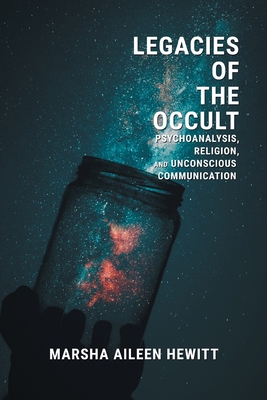Legacies of the Occult: Psychoanalysis, Religion, and Unconscious Communication

Legacies of the Occult: Psychoanalysis, Religion, and Unconscious Communication
Early psychological theorists such as William James, Frederic W. H. Myers, and Sigmund Freud all agreed that telepathy (aka thought transference, or unconscious communication) exists. Yet the phenomenon was largely ignored by subsequent generations of psychoanalysts, persisting only as a subterranean, quasi-spiritual presence, and has only regained significant interest recently.In Legacies of the Occult, Marsha Aileen Hewitt reviews the differing theories of James, Myers, and Freud, and extends their ideas to the field of religious psychology. The result is an insightful and highly original work that will be of interest to scholars of psychology, philosophy, and theology, as well as to the general reader.
Telepathy, thought transference, unconscious communication. While some important early psychological theorists such as William James, Frederic W. H. Myers and Sigmund Freud all agreed that the phenomenon exists, their theoretical approaches to it were very different. James's and Myers's interpretations of and experimental investigations into telepathy or thought transference were an inextricable part of their psychical researches. Freud's insistence on the reality of thought transference had nothing to do with psychical research or paranormal phenomena, which he largely repudiated. Thought transference for Freud was located in a theory of the unconscious that was radically different from the subliminal mind embraced by James and Myers. Today thought transference is most commonly described as unconscious communication but was largely ignored by subsequent generations of psychoanalysts until most recently. Nonetheless, the recognition of unconscious communication has persisted as a subterranean, quasi-spiritual presence in psychoanalysis to this day. As psychoanalysis becomes more interested in unconscious communication and develops theories of loosely boundaried subjectivities that open up to transcendent dimensions of reality, it begins to assume the features of a religious psychology. Thus, a fuller understanding of how unconscious communication resonates with mystical overtones may be more deeply clarified, articulated and elaborated in contemporary psychoanalysis in an explicit dialogue with psychoanalytically literate scholars of religion. In Legacies of the Occult Marsha Aileen Hewitt argues that some of the leading theorists of unconscious communication represent a 'mystical turn' that is infused with both a spirituality and a revitalized int
PRP: 314.13 Lei
Acesta este Prețul Recomandat de Producător. Prețul de vânzare al produsului este afișat mai jos.
282.72Lei
282.72Lei
314.13 LeiLivrare in 2-4 saptamani
Descrierea produsului
Early psychological theorists such as William James, Frederic W. H. Myers, and Sigmund Freud all agreed that telepathy (aka thought transference, or unconscious communication) exists. Yet the phenomenon was largely ignored by subsequent generations of psychoanalysts, persisting only as a subterranean, quasi-spiritual presence, and has only regained significant interest recently.In Legacies of the Occult, Marsha Aileen Hewitt reviews the differing theories of James, Myers, and Freud, and extends their ideas to the field of religious psychology. The result is an insightful and highly original work that will be of interest to scholars of psychology, philosophy, and theology, as well as to the general reader.
Telepathy, thought transference, unconscious communication. While some important early psychological theorists such as William James, Frederic W. H. Myers and Sigmund Freud all agreed that the phenomenon exists, their theoretical approaches to it were very different. James's and Myers's interpretations of and experimental investigations into telepathy or thought transference were an inextricable part of their psychical researches. Freud's insistence on the reality of thought transference had nothing to do with psychical research or paranormal phenomena, which he largely repudiated. Thought transference for Freud was located in a theory of the unconscious that was radically different from the subliminal mind embraced by James and Myers. Today thought transference is most commonly described as unconscious communication but was largely ignored by subsequent generations of psychoanalysts until most recently. Nonetheless, the recognition of unconscious communication has persisted as a subterranean, quasi-spiritual presence in psychoanalysis to this day. As psychoanalysis becomes more interested in unconscious communication and develops theories of loosely boundaried subjectivities that open up to transcendent dimensions of reality, it begins to assume the features of a religious psychology. Thus, a fuller understanding of how unconscious communication resonates with mystical overtones may be more deeply clarified, articulated and elaborated in contemporary psychoanalysis in an explicit dialogue with psychoanalytically literate scholars of religion. In Legacies of the Occult Marsha Aileen Hewitt argues that some of the leading theorists of unconscious communication represent a 'mystical turn' that is infused with both a spirituality and a revitalized int
Detaliile produsului











